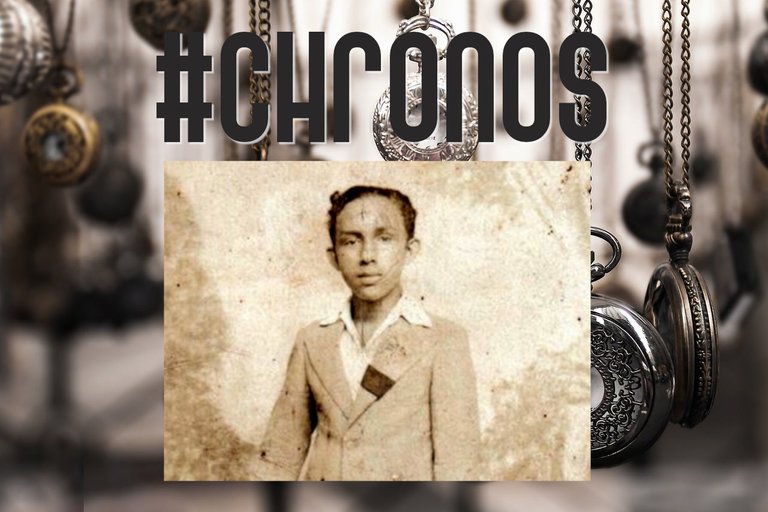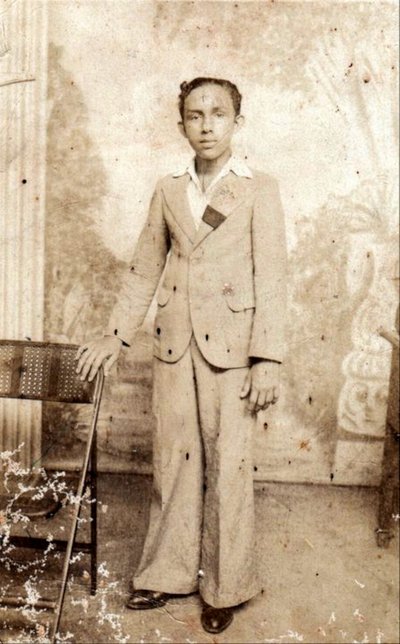Una fiesta rural de 1940 || A 1940's rural party #Chronos
La serie #Chronos la he dedicado a contar vivencias mías, propias, directamente extraídas de mi memoria y mis sentimientos. Por esa misma razón, escribí hace unas semanas una crónica sobre mi tía Isbelia. La única hermana que le sobrevive, se enteró en estos días y me pidió que se lo leyera vía telefónica, lo cual hice.
Ella quedó muy satisfecha con lo que allí narraba y al final de la conversación, me pidió que contara uno de los cuentos de mi papá, su hermano, que quedó para siempre en el anecdotario familiar y pasó a contarme una vez más la historia que desarrollo en esta publicación.
Así que hoy me salgo de mi rutina de contar mis propias crónicas, para contar una crónica familiar, complaciendo a mi tía Yolanda.
I have dedicated the #Chronos series to tell my own experiences, directly extracted from my memory and my feelings. For the same reason, a few weeks ago I wrote a chronicle about my aunt Isbelia. Her only surviving sister found out about it these days and asked me to read it to her via telephone, which I did.
She was very satisfied with what I narrated there and at the end of the conversation, she asked me to tell one of the stories of my dad, her brother, which remained forever in the family anecdotes and went on to tell me once again the story that I develop in this post.
So today I leave my routine of telling my own chronicles, to tell a family chronicle, pleasing my aunt Yolanda.
English version below!

En la Venezuela rural de 1940, mi padre, aún mozalbete, junto a un hermano menor, aprovecharon las vacaciones en las que volvieron a casa de su padre en San Diego de Cabrutica, para autoinvitarse a una fiesta de 15 años que, con toda pompa, se iba a realizar en una finca cercana.
Mi abuelo, partidario de que los muchachos tuvieran sus vivencias y experiencias, para que maduraran y se hicieran “hombres”, les autorizo la ida y además les cedió un burro para que los trasladara.
Se vistieron ambos muchachos con sus mejores galas, de flux, ensillaron al burro y tomaron rumbo a la fiesta.
Aunque no tenían invitación formal, por ser hijos de Don Santos, los recibieron bien y disfrutaron de la velada a plenitud. Bailaron así toda la noche, pues ambos eran diestros bailadores y con su cultura de muchachos que vivían en la ciudad, cautivaron a las damas presentes, incluyendo hasta la misma quinceañera.
En tanta conversación, tanta música y tanto baile, los hermanos se percataron de lo tarde que se había hecho, cuando ya no había nada que hacer. Así que, con la medianoche encima, tomaron su burro y se encaminaron a su casa.
La luna, a duras penas, se colaba entre las nubes y ocasionalmente brindaba un poco de luz para iluminar el camino, pues la energía eléctrica aún no rondaba aquellos caminos.
A mitad del trecho, el burro se detuvo repentinamente. Los muchachos empezaron a arrearlo e inútilmente halaron de sus riendas e infructuosamente usaron ramas a modo de fuete, que finalmente tuvieron el efecto contrario al esperado. Cuando menos lo esperaban, el burro se echó en el piso.
La brisa de la noche soplaba y los dos hermanos lo que veían venir era una tormenta, en que caso de que dejaran al burro allí. Haber contado con la confianza de su papá, como para que les cediera el burro para ir a una fiesta y regresar sin el animal, era una idea inaceptable, era romper esa confianza, era hablar mal de su madurez.
Así que aquellos niños en proceso de convertirse en hombres, se quitaron los sacos del flux para poder meter todas sus fuerzas y entre halar al pollino y cargarlo, irlo acercando a la casa. Tarea nada fácil en aquella oscuridad, en caminos de tierra, en el que el polvo, la tierra, el pasto y el sudor, fueron cambiando la semblanza señorial que llevaban a su salida.
Varias horas se consumió su tarea, pero llevaron la tarea a buen fin y cuando ya solo faltaban escasos metros para llegar a la finca, el animal, al reconocer su casa, se levantó y al trote se fue al establo.
Los muchachos celebraron su hazaña y solo les quedó sacudirse parte del polvo de encima, de los pantalones y camisa, pues los sacos se quedaron en el camino y por la oscuridad no lo notaron.
El haber regresado con el burro, aunque faltara parte del vestuario de los dos chicos y que llegaran sucios, como venidos de la más dura faena, fue el logro más importante y mi abuelo los premió con su reconocimiento.
Pero ni la suciedad y el polvo, ni el sudor del esfuerzo cargando el burro, les quitaron la emoción de las polkas bailadas y de las amenas conversaciones con las jóvenes de la alta sociedad rural de aquellos predios.


Mi papá en 1942 || My father in 1942
English version
In the rural Venezuela of 1940, my father, still a young boy, together with a younger brother, took advantage of the vacations when they returned to their father's house in San Diego de Cabrutica, to invite themselves to a 15th birthday party that, with all pomp, was going to be held in a nearby farm.
My grandfather, in favor of the boys having their experiences, so that they could mature and become "men", authorized them to go and also gave them a donkey to transport them.
Both boys dressed in their best suit clothes, saddled the donkey and headed for the party.
Although they had no formal invitation, as they were Don Santos' sons, they were well received and enjoyed the evening to the fullest. They danced like this all night long, as both were skilled dancers and with their culture of boys who lived in the city, they captivated the ladies present, including even the fifteenth birthday girl herself.
In so much conversation, so much music and so much dancing, the brothers realized how late it was getting late, when there was nothing left to do. So, with midnight falling, they took their donkey and headed for home.
The moon, with difficulty, was barely breaking through the clouds and occasionally provided a little light to illuminate the road, since electric power was not yet available on those paths.
Halfway down the trail, the donkey suddenly stopped. The boys began to herd the donkey and futilely pulled on its reins and unsuccessfully used branches as a pole, which finally had the opposite effect to that expected. When they least expected it, the donkey lay down on the ground.
The night breeze was blowing and the two brothers could see a storm coming, in case they left the donkey there. To have counted on their father's trust, to have him give them the donkey to go to a party and return without the animal, was an unacceptable idea, it was to break that trust, it was to speak badly of their maturity.
So those boys in the process of becoming men, took off their sacks so they could put all their strength into pulling the donkey and carrying it, bringing it closer to the house. Not an easy task in that darkness, on dirt roads, where the dust, the dirt, the grass and the sweat, were changing the stately semblance they wore at their departure.
Several hours were consumed by their task, but they brought the task to a good end and when they were only a few meters away from the farm, the animal, upon recognizing its home, got up and trotted off to the stable.
The boys celebrated their feat and only had to shake off some of the dust from their pants and shirts, because the sacks were left on the road and because of the darkness they did not notice it.
To have returned with the donkey, even though part of the two boys' wardrobe was missing and they arrived dirty, as if they had come from the hardest work, was the most important achievement and my grandfather rewarded them with his recognition.
But neither the dirt and dust, nor the sweat from the effort of carrying the donkey, took away the excitement of the polkas danced and the pleasant conversations with the young women of the rural high society of those lands.
Fuente de las imágenes || Image sources [1]

Este texto pertenece a mi serie #Chronos. Puedes leer más sobre la misma en Mis crónicas literarias. Si es de tu agrado este estilo y quieres sumarte a la creación de crónicas literarias, te invito a usar la etiqueta #chronos para la misma.
This writing is part of my series #Chronos. You can read more about it on My literary chronicles. If you like this style and want to join the creation of literary chronicles, I invite you to use the hashtag #chronos for it.


Vote la-colmena for witness
By @ylich
https://twitter.com/3916290856/status/1592331731306442753
The rewards earned on this comment will go directly to the people( @ylich ) sharing the post on Twitter as long as they are registered with @poshtoken. Sign up at https://hiveposh.com.
Que historia más cómica, que burro más obstinado, seguro que no fueron más nunca a una festividad en él
¡Pues, yo creo que mucho más obstinado que el burro, resultaron esos muchachos, porque sí lo volvieron a hacer y en más de una ocasión!
¡Gracias por comentar!
Muy interesante la anécdota, esos burros sí que son obstinados.
Saludos
¡Jajaja, completamente de acuerdo! Hay ocasiones en que nos deberíamos parecernos un poco a ellos... ¡En ese sentido, claro! 😆
¡Un abrazo!
Esta publicación ha recibido el voto de Literatos, la comunidad de literatura en español en Hive y ha sido compartido en el blog de nuestra cuenta.
¿Quieres contribuir a engrandecer este proyecto? ¡Haz clic aquí y entérate cómo!
Un suculento escrito con ese ambiente rural transmitido mediante letras.
Me han atraído estas letras de vivencias, recuerdo al gran Gabo con su realismo mágico. No sé lee mucho de aquellas épocas de antaño.
Encantado con tus letras.
Excelente tarde.
Gracias por compartir.
¡Vaya comentario tan halagador! ¡Muchísimas gracias, por la lectura y por comentar!
Magnifica estampa de una venezuela en transición, entre lo rural y lo urbano. @ylich .
Me has hecho recordar una vieja canción que me encanta porque retrata el mismo tema:
Qué simpatica historia!
¡Muchísimas gracias Graciela! Sí, sin duda esa canción responde a esa Venezuela, a esa vida y ese momento...
¡Agradecido por tu lectura y tu comentario! 🤗